![]()
The Words of the Oh Family
|
|
The Words of the Oh Family |
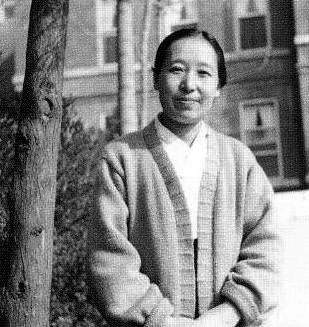
I was born into the Oh clan of Dongchon Village in South Pyeong-an Province, in 1914. My father was Deok Je Oh, and my mother; Deok Hong Kim. My father was the oldest of six siblings, and the one who was to carry on the family traditions. As a young man, he had studied modern sciences and done well for himself. At the time, he was staying in Seoul. In accordance with the custom of the time, by which the wife did not accompany her husband wherever he went, my father lived in a small house and came to visit my mother now and then. My mother gave birth to two girls; I am the younger of the two. Since my father was the oldest son, for years, my mother prayed every day for a son, but my father only came home once a year and stayed only two days at that.
The Oh clan had converted to Christianity early on, and we went to a church that was about four kilometers away, my mother carrying me on her back.
We lived in a farming village only forty kilometers from Pyongyang that was made up only of members of the Oh clan, about forty households in total. None of the families were poor. It did not have an actual school, only a village school where children learned to write Chinese characters.
In the year I turned six, the March 1 Independence Uprising' took place. I remember seeing people shouting Mansei while being carried on my mother's back.
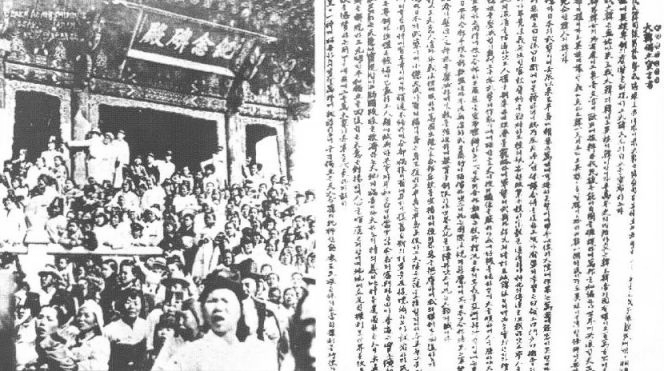
Mrs.
Oh remembered the March 1st Movement, a nationwide uprising against
Japanese domination of Korea. The photo shows a rally in central
Seoul during the uprising and the text of the Declaration of
Independence.
Fortunately, there was a church in a village called Gamsan, and a school of the modern sciences was established there. To get there, I had to walk four kilometers. At the time, women were not allowed to go out of their homesteads, but my parents allowed me to go to school, saying that I was like a son to them. Worried that I might get hurt or become sick, my mother swept the road every morning when it snowed, and in the evening she came out to meet me and carried me home on her back. Six years passed in this manner.
The road consisted mainly of a ridge between rice fields and vegetable patches, which became muddy when it rained, the mud sticking to my shoes and not coming off.
I also had to pass through a narrow trail, which in spring was so dewy that the bottom half of my clothes became wet and in winter so buried in snow that my feet froze. My feet would become so numb that I lost all feeling in them but would thaw by themselves and become warm, by which time I would arrive at school. My school was founded by Christians, and except for Japanese language classes we did not speak Japanese. All the teachers had gone to college in Japan, but they had lost their jobs when they participated in the independence movement. My class was the first to graduate in that school. The people who taught us had been college professors at one time, but they taught us without receiving a salary.
When I turned fifteen, I graduated from elementary school. I was intending to continue my studies at Pyongyang High School. On the morning of the entrance exam, my grandfather said that it was enough for a girl to know how to read the newspaper and that I should not do something that no one in the clan had yet done. I had no choice but to give up higher education. I stayed in my room for a whole year in complete seclusion. My mother, worried that I might become ill, thought that I would forget about studying if I married. It was customary then for people to marry young, so she hastily prepared to marry me off. Thus, I came to be married into the family of a church elder in Anju in the year that I became eighteen.
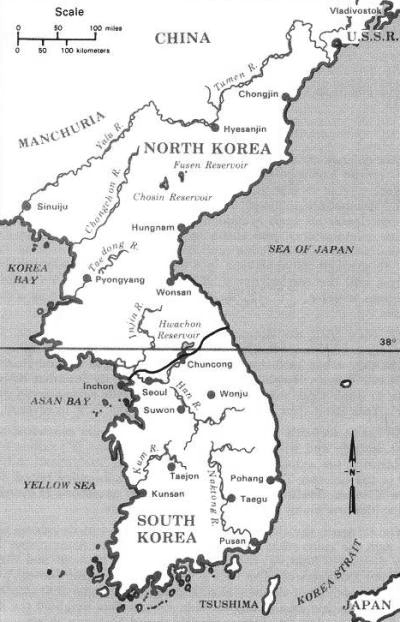
Anju was about thirty kilometers from my parents' home by train. My father-in-law was a church elder, my mother-in-law a deaconess. Though theirs was a headstrong and strict clan, it was also one of the earliest to be enlightened. My father-in- law had been accused of being one of the ringleaders in the independence movement' and had suffered long imprisonment in Pyongyang. He viewed all Japanese people with a mortal hatred, but he was very intelligent and kind. I thus became the wife of the oldest son of five brothers. Though my husband's family was rich, they had strict rules in housekeeping and for eighteen years I learned endurance. I was highly praised for maintaining a harmonious and peaceful household. During those years, I gave birth to and raised six children.
Some time back, after I was married, my parents learned about the new truth.} At the time, Rev. Yong Do Lee performed many works of the Holy Spirit, and they were greatly influenced. Having received grace through Rev. Lee, his followers built a temple and lived in joy. At first, the denominations other churches seemed to accept them, but later they accused the followers of heresy, and in time the followers formed a separate denomination. The reverend died at the age of thirty- three.
A while later, Mrs. Seong Do Kim (mother of Seok On Jeong) of Cheolsan appeared as the "New Lord" and performed many works of the Holy Spirit, and all the followers shared whatever they had or did not have and experienced miracles. The Oh clan also shared this joy with them, though they were called heretics. Mrs. Kim, however, passed away. When the New Lord passed away, all the followers were devastated. They wept in sorrow and offered deep prayers.
Then a miracle happened. One of Mrs. Kim's followers, Mrs. Ho Bin Huh, received grace, and the works of the Holy Spirit recommenced. The inside the Belly Church was founded through Mrs. Huh. Their doctrine taught that the returning Lord would not come on a cloud but as a person, that he would come to Pyongyang, Korea, and that whereas the Lord who came two thousand years ago came as a baby to Israel, the returning Lord would come as an adult. It also taught that the Fall had not occurred as the result of eating a certain fruit but that the Fall was sexual, and that the entire Bible was made up of metaphors and symbols.
My mother had not studied much; at best, she knew how to read hymn lyrics, but she confidently made effort to witness to me. At first, I thought that it was the traditional faith to believe the Bible literally, and I did not obey her. My mother grew impatient and called me stone headed. When I opened my mouth to oppose her, she covered it, lest I sin through it. She loved me best of all her children, and since I did not relent she had no choice but to offer bows incessantly for my sake every night, facing east. Not only that, but she said that when the Lord came the first time, he was born in a manger, did not dress well, was not believed by the Jewish people and suffered all his life until he died in wretchedness. Hence, we needed to do our best to serve the Lord at his Second Coming well and do everything for him that the first Lord had not had done for him when he came. Thus, I became connected to the Inside the Belly Church.
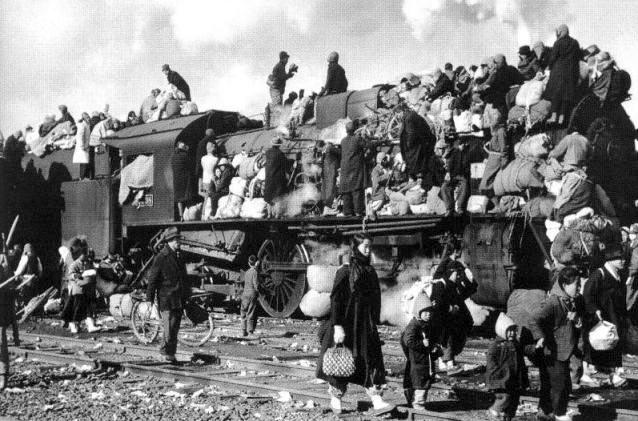
Civilians
desperate to get away from conflict during the Korean War clamber
onto a south- bound train at Gaeseong, near the border. Mrs. Oh
travelled all the way to Busan in this way.
Though Korea was liberated on August 15, 1945, Il Sung Kim followed the Russian army into northern Korea.' Our joy at being liberated was short-lived; everyone soon began to tremble in fear. During the night, Russian soldiers turned into thieves, and during the day they forcibly took whatever precious objects they could find, such as watches and so on. The communist ringleader first got rid of the landowners and made their servants the new owners. If you said one wrong word, you were arrested for being a reactionary or pro-Japanese. Pandemonium reigned. Japanese people were killed on sight, and we had cause only to sigh deeply. At the time, those who were quick enough fled south. Thankfully, we were not purged because we owned many factories. I however, was so anxious all the time that I could not go on living in this way.
For a start, we left Anju and bought a house in Pyongyang and moved there in 1946. Sometime later, they made me the head of my neighborhood. I was in trouble, because I disliked them deeply but if I refused they would have accused me of being a reactionary. Also, I did not want the job of checking on twelve households every day; after racking my brains about it, we sold the house and moved again, from Gyeongsanggol to a big house situated in the middle of the Shinchang-ri market. During the day, Russian soldiers filled the streets, and during the night thieves were everywhere. Once, we were robbed at midnight. Thieves opened the door of the shop and took everything without restriction. We could do nothing but sit still and breathe quietly. During the night, the townspeople used to chase away thieves by wildly drumming on brass basins.
I had sent my husband to Seoul a few months before. After I gave birth to my youngest daughter in February 1948, I heard a rumor that a presidential election was scheduled to take place on May 10 in Seoul/ and that afterward the roads would be blocked completely and no one would be able to cross the thirty-eighth parallel. I could not endure it any longer, and twenty-five days after giving birth, I resolved to go to Seoul. I first sent off my two oldest boys to Haeju, after which I left home, after paying two guides to show us the way, with Hye Sook, Yoon Joo, Eui Joo, and the newborn baby on my back. I did not give a thought to the house in Pyongyang or all our things, but it broke my heart to part with my beloved mother. Mother could not stop me from leaving, and she could not tell me to go, so all she did was sigh and ask why I was going to Seoul when the Lord was going to come to Pyongyang. Some time back, the people who were making preparations to receive the Lord had received the revelation that Pyongyang would become Eden, and they had even prepared a site at the foot of Moran Hill to build a palace as they waited for his coming. My older sister was one of the zealous followers. It was a time when no one even thought about Seoul. I alone stubbornly insisted on going there, thinking vaguely that we would meet again in three years. At the time, it was my opinion that if the Lord did come to Pyongyang he would have to move to Seoul because he would not be able to find a place to settle down in a communist state. I left, saying, "Mother, please be well. I will see you in three years." Thirty years have now passed. It is truly heartrending.
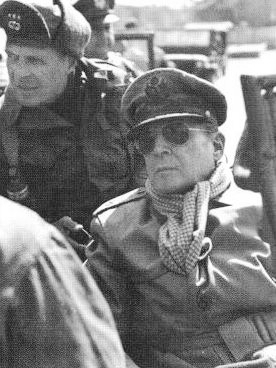
General
Douglas MacArthur
Fearing that others might see us, they could not even come to the gate to see me off. I turned my back on the house and went to Pyongyang Station, where I bought train tickets and made my way to the ticket barrier. All my companions were allowed to pass through, but they stopped me. Perhaps Satan knew I was leaving; at any rate, I was very uneasy. I finally made my way through, telling lies though I wasn't good at it. A woman who had just delivered a child and had been lying in bed only a while ago was forced to risk her life. We got on the train to Gaeseong but were forced to alight from the train midway. They investigated each of us, asking why we had come there and if we were planning to go to Seoul. I broke into a sweat. With God's help, we were finally freed. We spent the night in an inn. We rested during the day and walked through the night. Four days later about sunrise, we met a policeman who told us that we were in southern Korea. When I realized that we had finally crossed that infamous, invisible thirty- eighth parallel, I all but fainted. This meeting with the policeman felt like a meeting with the Savior. I sat down right there and then and wept.
We had walked all night, crossing mountains and rivers, and because my rubber shoes were slippery I had taken them off and had walked wearing nothing but socks. The policeman said, "Ma'am, you have done well." I replied, "I will never go back to Pyongyang" and handed him my northern Korean citizen's identification card.
When I came to my senses and examined myself, I saw that I had lost my shoes, my legs were swollen and I looked like a crazy person. In a word, I was a mess. With much difficulty, I went downtown and bought a pair of rubber shoes, put them on, and took a direct train to Seoul via Gaeseong.
When I got off the train at Seoul Station with my little children, I felt helpless, not knowing where I should go or what direction I should take, being the rustic that I was. After much thought, I remembered hearing that Dr. Ri Wook Jang, a relative of her husband, was the head of the teacher's college. Not knowing anything about streetcars, I hailed three rickshaws -- there were rickshaws at the time -- and told the pullers to take us to the official residence of the head of the teacher's college. We soon arrived at the residence. They let us stay with them for a while.
Though I met my husband, he did not tell me even once that I had done well. Instead, he harassed me every night, asking why I had come and how we were to live. I endured it, without answering him, and resolved in my heart that if we had to die we would die in Seoul, and that I would educate my six children as well as anyone else.
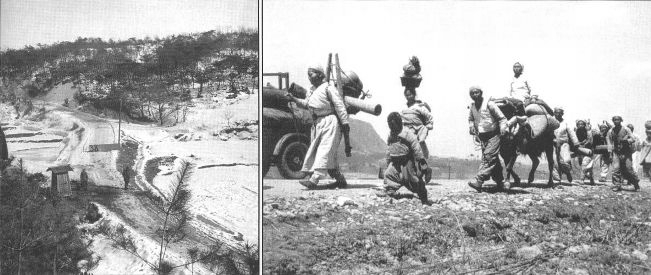
Left:
The hastily conceived division at the thirty-eighth parallel was
originally part of a plan to facilitate Japanese surrender and
repatriation; for how it changed through the Korean Armistice; Right:
Wartime refugees stream south
The children were going to school and we were all but settled down when the Korean civil war broke out on June 25, 1950. The communists in North Korea came to Seoul. All our neighbors in front of us and next to us became communists as well. Seoul was in turmoil. Including the family of my brother- in-law, we were fifteen people in total, and we were unable to leave Seoul in time. Moreover, we had no end of trouble hiding five men. One of the communists asked me if I believed in Jesus, and I answered yes. Then he asked me how long I had believed in him, and when I answered truthfully that it had been thirty years, they started to pay special attention to us. To get away from them, we fled northward, not southward, walking about thirty kilometers.
At our place of refuge, we suffered much, and my husband and oldest son were taken at one time. Then the South recovered their lost land on September 28 and we returned home, only to find that two of our next-door neighbors had died and our porch had been burned. Not only that, when the South Korean Army marched north and took Pyongyang and Anju, my impatient husband and oldest son went with them to Pyongyang and Anju and met with the family members we had left behind. They also met with my mother and sister, who were still waiting, saying that the Lord was going to come to Pyongyang.
We were all overjoyed, thinking that the nation would be united soon, but there came a rude awakening. The Communist Chinese army came flooding down, and everyone had to retreat. We had left early this time, with the intention of going south, but the train was already full. In the end, our family rode on top of a train car, on blankets spread out to protect the children, and we shouted to each other not to fall asleep because we would die if we dozed. We finally reached Busan after riding in this way for five days.